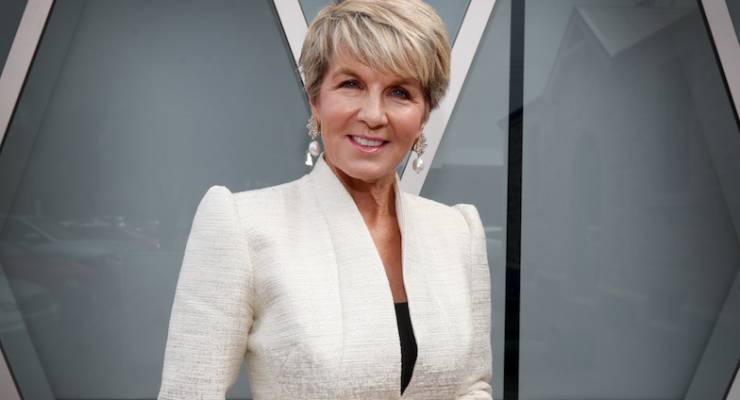
Private foreign aid contractor Palladium has been raking in millions in COVID-19 contracts as Australia turns to the consultancy firm to help deliver medical supplies in the Asia-Pacific, but it’s unclear what role if any former foreign affairs minister Julie Bishop has played.
Bishop was appointed to Palladium’s board of directors in July 2019, but her name has mysteriously disappeared from the company’s website. Palladium declined to respond to questions about whether she remained in the role, or whether she was still advising the company in a different position — such as through her private consulting firm.
Bishop’s appointment to the multinational aid contractor came just four months after she quit politics, and around the same time former defence minister Christopher Pyne was hired as a defence consultant for Ernst & Young (EY).
Labor accused Bishop of breaching ministerial guidelines given Palladium had reaped hundreds of millions of dollars in government contracts while she was minister. She was later cleared of any breach but a Senate inquiry has since called for the ministerial standards probe into Bishop and Pyne to be reopened.
Palladium has had a lucrative few months. In May alone it was involved in eight separate ongoing contracts with the Department of Foreign Affairs and Trade (DFAT), worth a total of $26 million. These included two management advisory contracts worth a total $2.8 million relating to Australia’s foreign aid programs in Vanuatu and Tonga, and an $8.9 million contract for logistics support for Australia’s overall response to COVID-19 in the Pacific. It was handed another contract, worth $9.5 million, for logistics support regarding the recent outbreak in India.
Questions over Bishop’s role at Palladium come as she is also under pressure to explain her role at collapsed financier Greensill Capital. The Attorney-General’s Department has written to her seeking “clarification” after it emerged this month that she had arranged a meeting between Greensill and Treasury officials eight days before she was officially registered as a lobbyist for the company.
Labor’s industry spokesman Ed Husic has also pushed for further clarification around her role at Greensill.
“We do know that Julie Bishop used her government contacts to introduce Greensill to some of the highest political offices in Australia and there should be transparency around these meetings,” he said earlier this month.
Ministers can avoid being captured by Australia’s lobbyist rules by being appointed directly to a company board.
When Palladium poached Bishop it said she would be joining a six-strong board of directors, including executive chairman Kim Bredhauer, a former member of the Australian Aid Advisory Council. Bishop said at the time the role reflected her belief that the private sector was “key to lifting living standards and economic development” in the Asia-Pacific. DFAT was reportedly blindsided by the appointment, internal documents later showed.
Crikey contacted Bishop for comment regarding the Palladium role. She has previously said her position at the contractor complies with her obligations as a former minister.








Bishops role looks suspiciously like the new form of corruption we are coming to expect from our political leaders. It looks for all the world like a reward for doing dodgy deals to get rivers of tax payer money flowing to a LNP friendly company disguised as a job earned, more or less plausibly, on merit.
It smells as bad as it looks and should be investigated by the police. She needs to at least be in the dock , if not in goal.
Her own Barbie doll. What an ambition in life. What a reward. Groan. Bishop is just another ex LNP pollie with her nose in the bottomless trough. As she has demonstrated. The stench of a million dead fish still wafts across the lands.
“Nose in the bottomless trough” indeed. She has become what might be called a political whore, paid for her services, whereever and whatever they may be. Too bad. Many women admired her…. once long ago.!